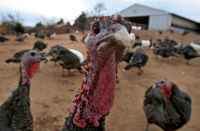



Of Poop Power and Gas Emissions
MINNESOTA - Greg Langmo's work is the centerpiece of America's Thanksgiving dinner table. But finding a use for the by-products of his family-run turkey farm near Litchfield, Minn., has long been a challenge for Langmo and his fellow farmers. |
| >> A turkey on a turkey farm. |
"When we clean out a barn, we pile up the litter," says Langmo, standing amid his noisy flock of 16,000 hens. "Then, when the farmers need it and can, they spread it on their fields as fertilizer." The problem is, it smells. And when you have a lot of birds, there's a lot of it.
Langmo Farms runs about a million birds a year through 12 barns. Each barn generates an estimated 33 semi-truckloads of manure and litter a year. A few years back, as the suburbs crept closer, complaints began and local officials told the farmers to do something about the Turkey-poop stench. That's when Langmo lit on a solution using technology launched by a British company — burn the poultry litter as fuel for a steam turbine, which creates electricity that can be sold to the nation's power grid. And by-products from the burn are still sold as fertilizer.
The result of his work: Fibrominn LLC, America's first poultry-litter biomass power plant, which flipped its switch Monday at a plant on the western edge of Benson, Minn. Benson city officials admit when they first heard the idea, they chuckled. Yes, the community of 3,376 residents has embraced recycling, launching one of the nation's first diaper recycling programs in the 1980s. The city even bought 50,000 shares in the experimental Chippewa Valley Ethanol Cooperative in the 1990s. But Turkey-poop as a source of electricity seemed a little — well, bird-brained.
"We joked about it on our way down to the first presentation," says City Manager Rob Wolfington. But by the time they headed back home from that 1998 meeting, Wolfington admits they were talking turkey.








